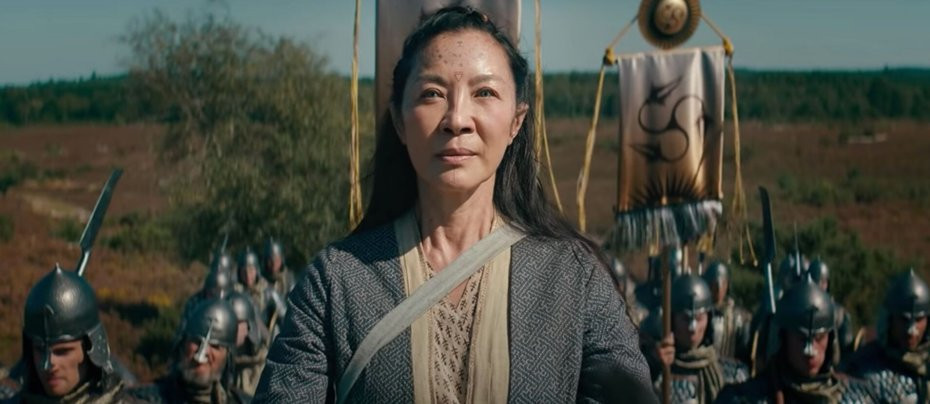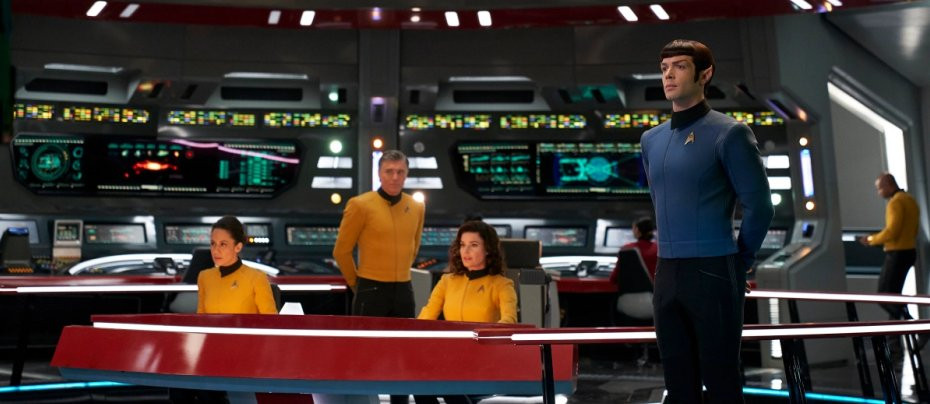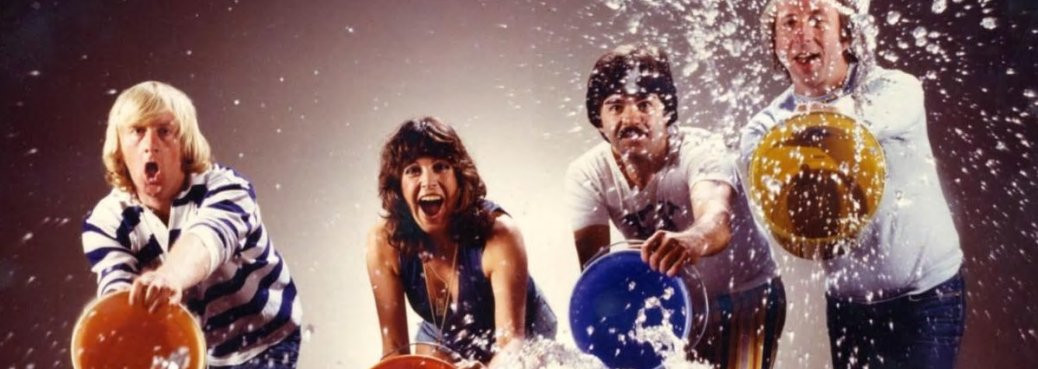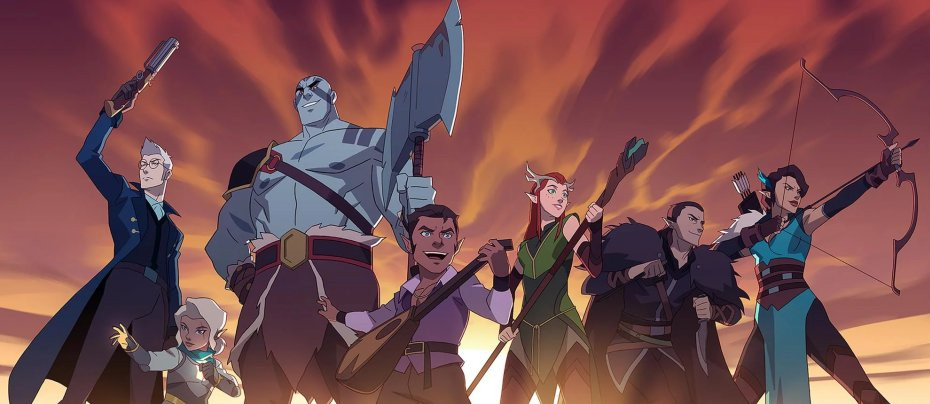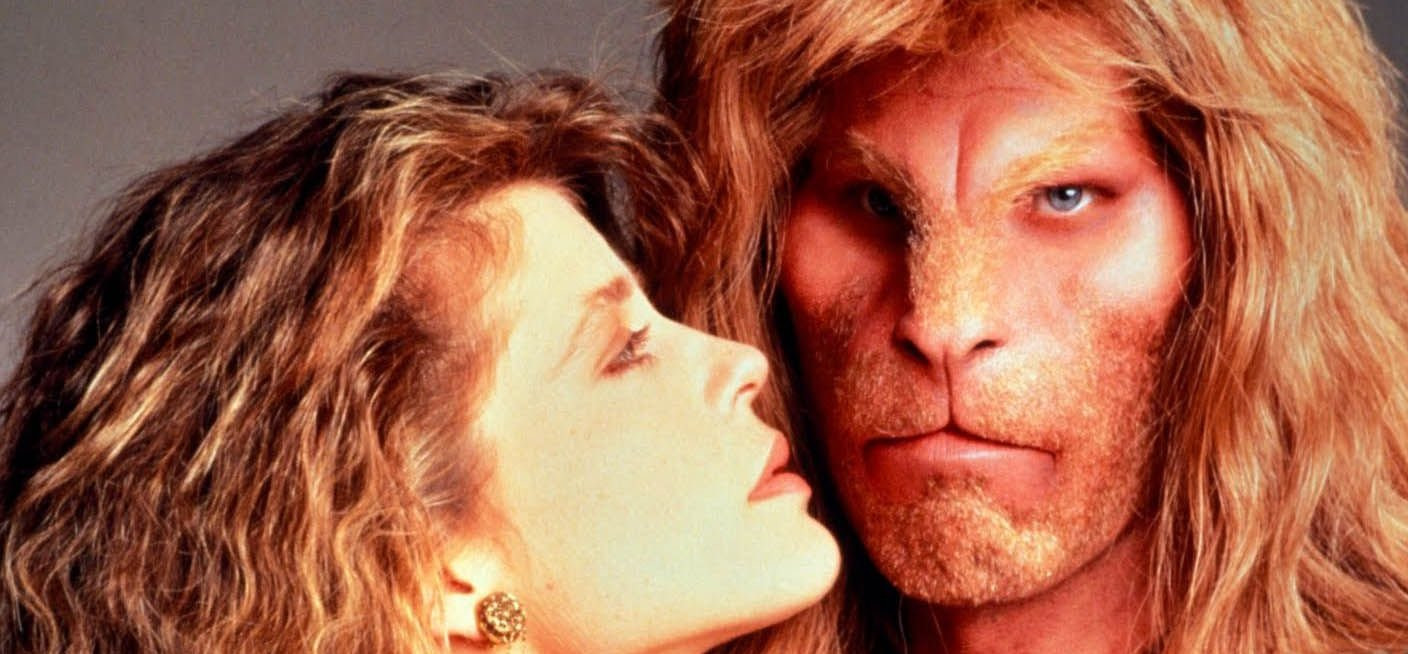
The Lord of the Rings: Rings of Power
2022 - United StatesSuffice it to say that 'The Rings of Power' is simply not Tolkien
Review of The Rings of Power by John Winterson Richards
Commenting on Amazon's 'Lord of the Rings: The Rings of Power' is now as perilous as a trip to Mordor with a golden Nazgul magnet. It seems that half the world will be angered by anything short of unqualified hatred of the project while the other half will consider anything short of unqualified approval "racist" and possibly "misogynist." Yet it is possible to sum up this overview of the first season in a single all-purpose sentence which should satisfy both sides:
"It is certainly worth watching if only for the stunning visual aesthetics."
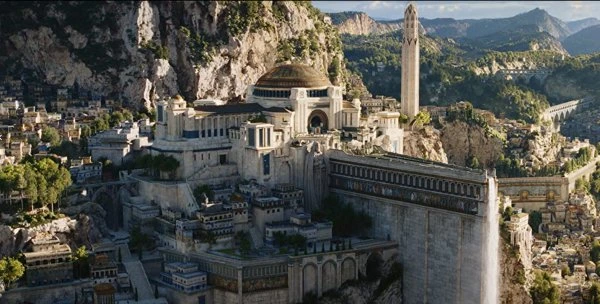
That sentence is literally true, word for word, which is both the best and the worst of 'The Rings of Power' in one. It should indeed be seen for the beauty of its images alone - because they are beautiful and because there is little else about it to compel attention. This is not to say that everything else is necessarily bad. It is simply that, if judged as storytelling rather than as an art exhibition, it is not the great "event" television it ought to be with the Tolkien name attached.
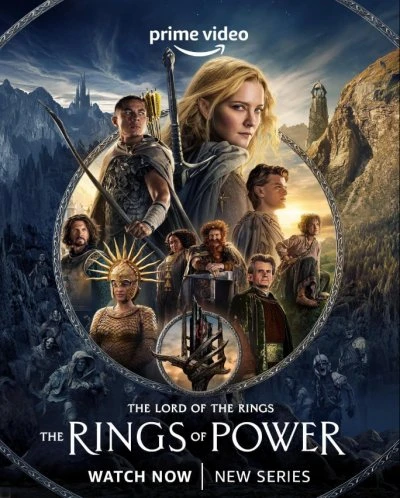
It was definitely intended to be an event. Amazon are reported to have paid around $250 million for the television rights to little more than the Appendices of the third volume of Tolkien's 'The Lord of the Rings.' Crazy as this sounds, it might have been a very shrewd move given Amazon's particular business model. There is no bigger brand on the market. Voted the greatest book of the 20th Century, 'The Lord of the Rings' is a landmark of Western culture. Tolkien set out to build a mythology of England and succeeded. The novel is simultaneously a product of Tolkien's own faith and the closest many of no particular religion have to a sacred text. It is therefore a book that really matters to a great many people of all creeds and colours all over the world. Its name on its own is enough to make something "must see" television that will attract subscribers to Amazon Prime, which gives Amazon a fairly solid basic income while simultaneously opening the subscribers up to marketing of Amazon's other products and services. Once these subscribers are signed up, all Amazon have to do is maintain a certain level of quality so that they keep resubscribing - and that is where Amazon may have a problem.
Having spent all that money on a brave but defensible business decision, Amazon's next business decision was simply bizarre: they entrusted this highly prestigious intellectual property which they had just acquired at enormous expense to a writing team with very little experience.
It should be stressed that looking for new writers outside the magic circles of Hollywood is not in itself a bad idea. On the contrary, producers and "content" providers would do well to make more of an effort to seek out original talent given the lack of imagination and differing perspectives that characterises the vast majority of recent productions. To have found genuine new voices and then hired a veteran Supervising Producer to give their work the necessary professional polish might have been a well calculated gamble if they had found writers with a particular affinity for the source material.
However, within the first few minutes of the opening episode of 'The Rings of Power' the risible dialogue makes it clear that we are in the hands of total amateurs with no real feeling for JRR Tolkien. It is central to Tolkien's appeal that he was a man of incredibly broad reading who really understood the power of language. Professor of Anglo-Saxon, and then of English Literature, at Oxford, he was his generation's leading authority on 'Beowulf' and a pioneer of the study of Icelandic Sagas, both of which are huge influences on 'The Lord of the Rings.' He had a particular love and gift for rhythm, and, as he was writing, he tested his compositions by reading them aloud to his friends at the Eagle and Child pub. Since these friends, including CS Lewis, were also experts who shared his passion for words, his work went through a famously tough proving process before publication ("Not another ******* Elf!" said Hugo Dyson).
The script is at its worst when it tries to be profound by delivering laboured analogies
Sir Peter Jackson and his co-writers understood and valued this when they adapted 'Lord of the Rings' for the cinema. While there are necessarily omissions and contractions, most of the big set piece speeches in the films are Tolkien substantially intact. Yes, Jackson sometimes took liberties - most serious Tolkienites could have done without the skateboarding Elf - but only once he had won the right to do so by demonstrating his respect and feel for the books. As a result, Jackson is hailed not only for filming what was widely held to be unfilmable before he did it but also for setting the standard for adaptations in general. The films have therefore become a case study in how these things should be done, which makes the contrast with the television version all the more regrettable. Jackson is reported to have offered to take a look at the television scripts, but never heard back. Leading Tolkien scholar Professor Tom Shippey was also reported to have been advising the television adaptation and then was not.

The television series had both a greater challenge and a greater opportunity in that the small fraction of Tolkien's writing on which 'The Rings of Power' is based contains little dialogue, leaving the writers completely free to make up their own - and demonstrate how bad they are at it. The attempts at high flown speech are particularly painful. Think of the sort of "Olde Englishe" heard in historical films written by "Golden Age" Hollywood hacks who had never actually been to England - but with frequent and arbitrary lapses into modem idiom. Every other sentence is written as if it meant to be portentous but comes across as pompous. Quite apart from the clumsy style, the dialogue breaks basic rules of scriptwriting, especially when it tries to jam exposition into conversation. There are countless "As you know, I was your father's best friend" type moments when characters remind each other of things they know already and which would never need to be spoken in real life. Every episode is a masterclass in how not to do it.
The script is at its worst when it tries to be profound by delivering laboured analogies. A positively silly parable involving ships and rocks in the first few minutes sets the tone from which the show never recovers. There is absolutely no insight to any of it. The writers lack Tolkien's deep wisdom, the product of decades of life experience, intense study, traditional Spirituality, and deep reflection, as well as his literary skills.
To be fair, there are some good lines, and even some good scenes, as the show goes on, but by then it is too late. The damage has been done. All credibility has been lost and it can never be recovered. Looking for errors replaces dramatic impact as the main source of entertainment.
If the dialogue is often positively bad, the best that can be said of the other two elements of the script, the plotting and the characterisation, is that they are of variable quality, rarely rising above the level of mediocrity and sometimes as embarrassing as the actual words.
Indeed, for a very long time it is not clear what the main storyline is meant to be. Where 'The Lord of the Rings' begins with one story that splits into several, 'The Rings of Power' does the opposite: it begins with several separate stories which we presume are destined to weave into one. This is a structure that has often been used on television, where there is more time to develop the different plots and characters than there is in a film. It sometimes works well. The problem here is that it is very hard to care about any of the stories initially put before us.

The spine of the story, in as much as there is one, is basically the same as a much criticised subplot in Jackson's 'Hobbit' trilogy, that a largely unspecified evil is rising. An Elf gets obsessive about some bad feelings, some villagers are threatened by Orcs, and some proto-Hobbits, called Harfoots, notice that the environment is not looking good. There is no clear threat and no definite objective for our protagonists. We start to wonder when the actual story will begin. Then episode after episode passes with very little happening in any of the storylines. Indeed, there are a couple of episodes, each over an hour long, in which the situation at the end is almost exactly the same as it was at the start. Honestly, nothing substantial has changed in a whole hour of extremely expensive television "drama." This might be bearable if we were at least spending time in the company of agreeable and interesting characters. We are not.
The characterisation of the Elves, especially Galadriel and Elrond, is probably the biggest complaint among hard core Tolkien fans. In the books, and in the Jackson films, they are mysterious, ethereal creatures. Their long lives have given them a serenity but also a degree of detachment. There is a definite "otherness" about them that the other races find intimidating. Although firmly on the side of Good, they project a disconcerting ambiguity, exemplified by Galadriel and Elrond, who, one feels, could easily be fearsome villains if they inclined that way. There is none of this in 'The Rings of Power.' The Elves here are little more than bog standard human beings who happen to talk a bit funny.
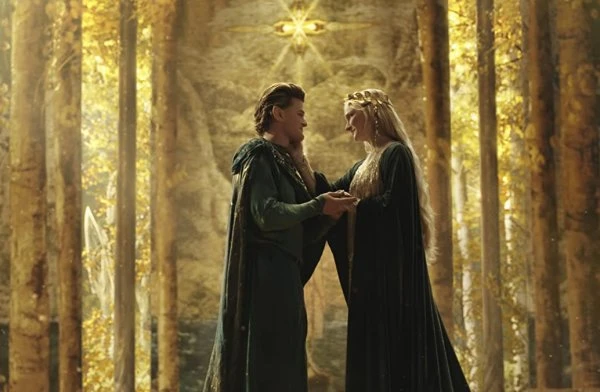
The characters known as Galadriel and Elrond in 'The Rings of Power' have little in common with the powerful nobles of the books and the Jackson films. We are supposed to think that, because they are younger, they are still struggling to find out who they are, but this is nonsense - both were born aristocrats and already very, very old by the time the story begins in 'The Rings of Power.' One cannot say how old because there seems to be a deliberate blurring of the timelines. Suffice it to say both are old enough not to exhibit the immaturity that defines them in the show.
Elrond is presented as an ambitious young diplomat. This might actually be an interesting characterisation if one was unfamiliar with the books and with Hugo Weaving's carefully judged performance in the films, but it is simply not Elrond. That said, Robert Aramayo's performance is engaging in its own right, and he might have made a good protagonist if only he had been given better lines and had not been called Elrond.

However, it is Galadriel who is apparently meant to be our main protagonist. Remember Galadriel from the books and the films? Remember the wise, perceptive, self-possessed, charming, enigmatic, unsettling, and occasionally terrifying ruler with undefined magical powers who won the heart even of the curmudgeonly Dwarf Gimli? Remember her? Well, you can forget all about her. She has nothing to do with this.
Here Galadriel is some sort of hard bitten army officer, but apparently not a very good one. Her own men mutiny against her, and one can see why. She is one of those self important managers who thinks their position is all it takes to order people around. She has been described as both "a Karen" (an unpleasant woman with an exaggerated sense of her own entitlement) and a "Mary Sue" (an idealised version of the author inserted into bad "fan fiction") at the same time - which is actually quite an achievement, to be simultaneously perfect and obnoxious. This is the complete opposite of the fascinating character described in the books and played by Cate Blanchett in the Jackson films. Indeed, out of respect to Tolkien, Jackson, and Blanchett, let us call 'The Rings of Power' Galadriel something else in order to distinguish her from the real one.
Mary Karen Galadriel is arrogant, egotistical, manipulative, and not as bright as she thinks - viewed objectively, her judgement is flawed and her decisions literally irrational. Yet she somehow assumes she has the right to order everyone else around, whether it be the captain of a ship that has just rescued her or a Queen in her own Throne Room. She announces herself like Maximus in 'Gladiator,' but Maximus was a humble leader who felt a great responsibility for those whom he led - as was Aragorn in 'The Lord of the Rings.'
Indeed, there is an obvious gap in the market for a management textbook in which Aragorn is compared with Mary Karen to show the difference between effective and toxic leadership styles. Remember how Aragorn uses his humility, expressing his fears honestly in order to persuade those following him to be better than they think? It brings a lump to the throat. Mary Karen just bosses people around, even if it is unclear why anyone ever listens to her. Her husband, Celeborn, appears to have faked his own death to get away from her.
There are faint hints of growth, and possibly even a character arc, in the last three episodes
We are doubtless being invited to admire the now standard "strong woman standing up for herself in a man's world." Mainstream journalists who have an unhealthily close relationship with the people on whom they are meant to be reporting tried at first to silence criticism of this formulaic approach by calling any questioning of it "misogynistic," but even they are now admitting that the show has a definite "Galadriel Problem" at its heart.
As a matter of fact, fantasy genre fans, who are traditionally for the most part young males, have long been open to female action heroes. Look no further than Eowyn in Tolkien's original novel, brought perfectly to life by Miranda Otto in the Jackson films. On a less elevated level, there was no shortage of warrior women, usually underdressed, in the "sword and sorcery" films of the 1980s, and in the 1990s it was Xena and Buffy who proved that a woman could maintain interest as the leading character of an action show over several seasons on television.
Indeed, by the 21st Century the woman who was a strong as any man, once a subversion of expectations, had become something of a cliche, but the likes of Jessica Jones showed how a fresh spin could still be put on it. Mary Karen in 'The Rings of Power' gives us all the worst aspects of the cliche, nothing more. Part of the appeal of Buffy, Xena, and Jessica is that they are not flawless. They are vulnerable. They make mistakes and sometimes they get beaten - but they learn from their failures and grow as people. They care for others. They have a sense of humour that helps them maintain perspective. Our Mary Karen is simply too good for all that.
There are faint hints of growth, and possibly even a character arc, in the last three episodes, but only after she has been threatening a prisoner with torture and genocide. This is our "hero"?
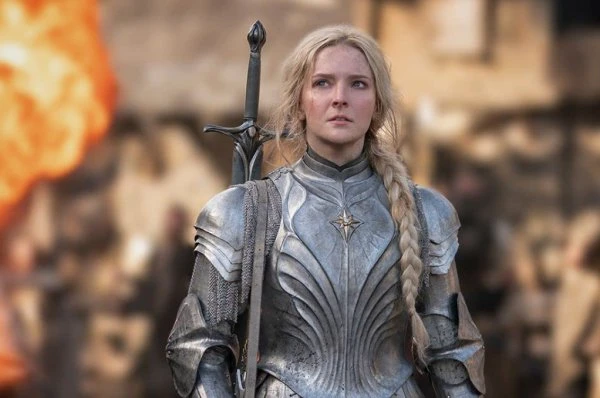
Mary Karen has, understandably, become the object of almost universal dislike. This has extended to criticism of the performance of Morfydd Clark, the actress who plays her, which may be unfair. She is only doing what the script tells her to do. Blanchett could not have done much better with some of the lines Clark is forced to speak. If anything, Clark deserves credit for her commitment to a badly designed role, and one feels that Tolkien would at least have approved of the way she rolls her Rs.
One searches desperately through the subplots for some other character for whom one can feel sympathy, but the writers do not make it easy for us. An Elf and a human woman have a Romeo and Juliet thing going but the total lack of chemistry between them rather contradicts the intended Message, capital M, that True Love, capital T, capital L, can transcend all cultural barriers.

The other human characters are, for the most part forgettable, except Trystan Gravelle convinces as a demagogue, Lloyd Owen is credible as a sensible career naval officer blissfully unaware that he has a capital D Destiny - even if it less credible that this character is the Elendil of the books - and Cynthia Addai-Robinson ('Spartacus: Vengeance') has presence as the Queen of Numenor, but a good actress is again wasted on a poorly written part. Charlie Vickers keeps us guessing whether he might be the Aragorn of this piece or someone considerably less noble. Simon Merrells ('Spartacus: Vengeance,' 'Knightfall') looks and sounds the part as an Elf commander but the character is rather thrown away.

It was hardly original but still not without potential to have a gender swapped Frodo and Sam among the proto-Hobbit Harfoots. Markella Kavenagh as female Frodo and Megan Richards as female Sam are themselves quite amiable, especially in their care of a mysterious stranger who falls from the sky. However, their compassion in this respect only serves to highlight the unpleasantness of the Harfoots in general. Although instilled with a deeply collectivist mindset - "Nobody walks alone" they chant - they are quite ruthless about abandoning their sick and their injured. Apparently we are meant to like these people. Sir Lenny Henry is actually quite good as their "Trailfinder" but cannot disguise the fact that they are a creepy bunch. Their whole subplot also turns out to be totally irrelevant to the main story.
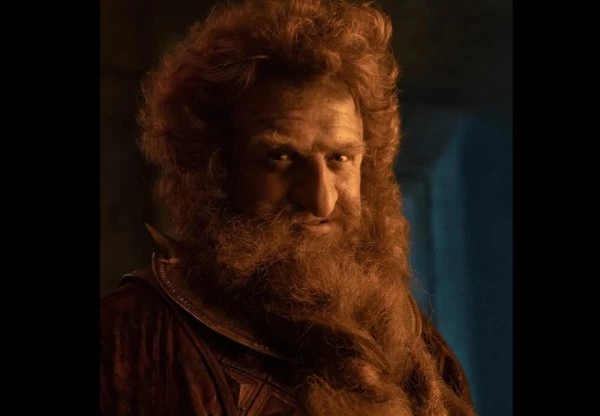
At least 'The Rings of Power' gets the Dwarves right. The always watchable Peter Mullan ('The Shoebox Zoo,' 'Ozark') does a lot with little time as their King, and Owain Arthur and Sophia Nomvete are good value as his son and daughter-in-law. However, the Dwarves are essentially supporting characters, the focus being on the Elves, who lose their mystery as a result.

The best performance by far comes from Joseph Mawle ('Game of Thrones,' 'Troy: Fall of a City') as a renegade Elf, giving evil an almost human face. Indeed, his care, or at least concern, for his Orcs contrasts with Galadriel's egomania. Even the Orcs are humanised more than usual. They seem to have more solidarity than the Harfoots. One begins to wonder with whom we are meant to be sympathising here.
A very long list could be made of the inconsistencies with Tolkien, but this is not the place. Please just take a moment to appreciate the restraint required to refrain from doing so on the part of someone who attended the very first screenings of all the Jackson LOTR films in his hometown, who often watches the extended edition on DVD, and who has long had a well thumbed copy of Professor Robert Foster's 'Complete Guide to Middle Earth' on his bookshelf.
Suffice it to say that 'The Rings of Power' is simply not Tolkien, and even if the story was judged as a commonplace sub-Tolkien, "big map," High Fantasy without the Tolkien name attached the best that could be said is that others have done it better. Even the flawed adaptation of 'The Wheel of Time,' also by Amazon, is more compelling. Since 'The Rings of Power' does have the Tolkien name attached, a higher standard is expected, and, as drama, it falls far short of it.
There is a lot of fake suspense and mystery that is neither suspenseful nor mysterious
Another very long list could be made of the internal inconsistencies and absurdities in the plot - they run to dozens even in the episode generally held to be the best - but there is no shortage of videos on YouTube, many of them better written than 'The Rings of Power,' which go into excruciating detail. It should be stressed that it is especially important in the fantasy genre for the non-fantastic elements to make sense if the story is to hold together and not degenerate into the surreal.
There is a lot of fake suspense and mystery that is neither suspenseful nor mysterious. The pay offs in the final episode are actually handled quite well, but there is a long wait for them and by then the viewer is probably reduced to nit-picking, so that much of their emotional impact is lost.
Regrettably, one cannot simply stop there and go straight on to finish on a positive note by talking about the pretty visuals. It would be cowardly to ignore the controversy about the eclectic casting policy, especially since Amazon, the producers, and some of the cast chose deliberately to make a big issue of it. Much of what followed was, predictably, like so much these days, a very silly "debate,' if one can use that word: it was more "a dialogue of the deaf," with neither side really listening to the other.
Hardly anyone these days has a problem with racial diversity in casting. Yet people who come to be entertained do not want a heavy-handed political lecture, even if they happen to agree with its underlying principles. There is a big difference between racial diversity and "colour blind" casting, in which people of different races are scattered almost randomly throughout the cast without reference to their roles and we are all supposed to pretend not to notice - except when the producers go on about it.
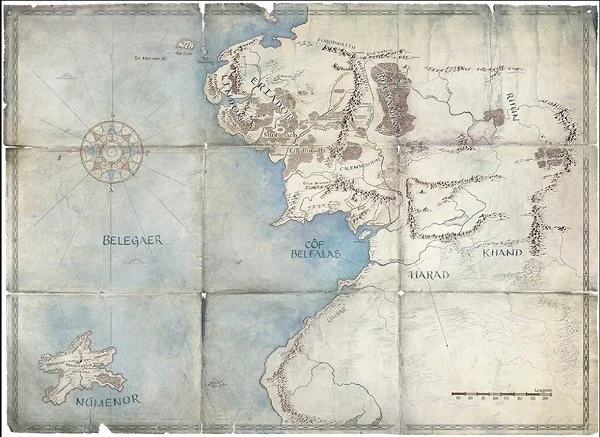
Amazon and the producers are fully aware of this vital distinction but pretended not to be. Tolkien's world is specific and deliberately limited in scale. One could cross the famous map in 'The Lord of the Rings' in a matter of weeks but for the dangers on the way, and it implied that the human population can be calculated in terms of thousands rather than millions. Most of the communities are small and tight knit, largely defined by close family relationships. This is a point made frequently in Tolkien's writings, and it reflects the reality of Dark Ages Britain, and its literary tradition, on which he based 'The Lord of the Rings.' Such communities are likely to be racially homogenous. They would not be an idealised version of multiracial LA. The "colour blind" casting is therefore intrusive and stops us buying in to this fantasy world, especially when carried to the ridiculous extent that members of the same family do not look like each other.
If the producers had been serious about racial diversity in casting, it would have worked better if people in different places had been of different races. Tolkien himself said that the Men of the South were darker skinned - in which case they all should have been darker skinned. The same is true of the Harfoots. Come to that there is no reason why the Men of Numenor, a lost race whose bloodline endures at the time of 'The Lord of the Rings,' should not have been all black or all Latino or all Asian or all whatever, so long as it was consistent. Even an entirely black cast would be dramatically more credible. While it is true that Tolkien had the Anglo-Saxons in mind when he wrote - except the Dwarves are apparently Welsh - there have been acclaimed all black productions of Shakespeare, so there is no objection in dramatic terms, even if it would be one more item on the very long list of departures from the source material. As it is, the arbitrary mixing we have instead is a major distraction. None of this should be read as disrespect to the non white cast members, who in fact contribute at least three of the better performances, if one insists on judging in racial terms as the producers do.
So far this has made little difference to the viewing figures. It seems that there really is no such thing as bad publicity. Indeed, the controversy is free marketing for Amazon. The Tolkien fan who posts long videos on 'YouTube' tearing the show to shreds has to watch it first and those who watch his videos may be tempted to watch the show for themselves to see if it is really that bad. There is even a definite phenomenon of "hate watching." Speculation is rife that Amazon used "fan baiting" - deliberately stirring up controversy to get publicity - as a central element of their marketing strategy. If so, it worked. The first episode of 'The Rings of Power' attracted a record 25 million views in the first 24 hours online, but then, given the Tolkien name, one would expect nothing less: after all it is why they paid that $250 million dollars for the use of it - which works out at $10 a view.
The real question is whether those initial viewers will keep watching and, more importantly, given the Amazon business model mentioned above, resubscribe to watch subsequent seasons. They will be more likely to do so if the story and characters are sufficiently compelling. So far they are not. This is doubly sad because it is obvious that a lot of work and imagination has gone into other aspects of the show. Going back to what was said in the beginning, it really is still worth seeing just for the look of the thing.
Various absurd figures have been floated for the total cost of production - up to $60 million per episode and over $400 million for the first season alone, with the prospect that this will eventually be a "billion dollar show" over the planned five seasons. Most of this is hyperbole intended to attract attention. It all depends on how one does the accounts, and in particular how one assigns initial costs, including the construction of reusable sets, marketing, and, of course, the $250 million for the rights, over five seasons. Amazon have already invested so much that they cannot afford not to keep going, even if we can expect production values to drop later.
Whatever the precise figure, one can see a lot of money there on the screen.
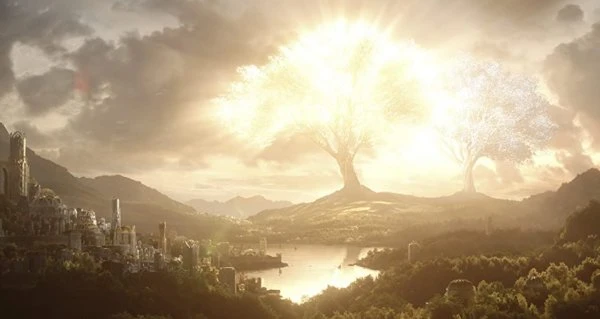
Like the writers, the art departments were given a particular challenge and an opportunity by the nature of the small part of Tolkien's writing secured by that $250 million. As well as dialogue, the Appendices are short on the long descriptive passages of the main narrative of 'The Lord of the Rings,' forcing the artists to fall back on their imaginations. Happily, unlike the writers, they were not found wanting in this respect.
The events of 'The Lord of the Rings' are set in the "Third Age," which is the somewhat decayed aftermath of the "Second Age," in which 'The Rings of Power' is set. If the Third Age is the equivalent of the historical Dark Ages, then the Second Age is the equivalent of the Roman Empire at the height of its power and wealth - before its Decline and Fall. References to how much grander things used to be are a constant theme in 'The Lord of the Rings.' Even the magical Elven Lordships of Rivendell and Lothlorien, the Mines of Moria, and the city of Minas Tirith are only vestiges of what was far greater many centuries before.
So 'The Rings of Power' has to be more spectacular than Jackson's cinematic 'The Lord of the Rings,' which is a tall order - but, for the most part, it succeeds, and this is why, for all the failings in the script, it is still a show that literally has to be seen.
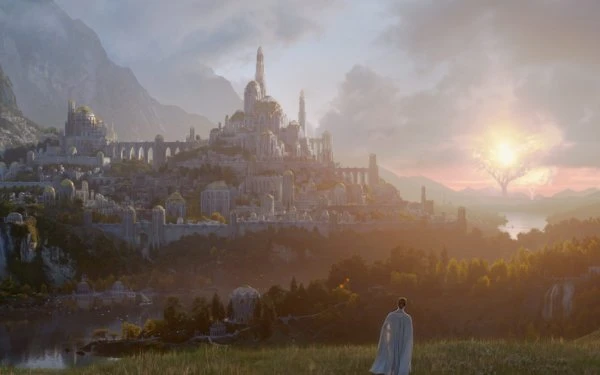
It gives us Lindon of the Elves, Khazad-dum of the Dwarves, and Numenor of Men (basically Tolkien's Atlantis) in all their pomp and glory. The production designs are works of art in themselves that could be framed and hung on walls. So are some of the stills. One could make a series of relaxation videos simply by putting the photographs and concept drawings in a loop to an Enya soundtrack - which might actually be more enjoyable than the drama.
Add to that the incredible scenery of New Zealand, where the location work was done, as it was for Jackson's 'The Lord of the Rings' and 'The Hobbit' films, and some clever Tolkienesque maps to help us keep track of things during transitions, and one has a television experience that rivals the cinematic and that sets new visual standards as the films did two decades ago.
All right, if you really want to be fussy, excellence, by definition, cannot be constant. There are definitely places where the quality of the CGI drops like a stone, and they stand out all the more because the general standard is so high. An infamous scene of Mary Karen climbing an ice wall - obviously referencing 'Game of Thrones,' which did it better - makes a very bad impression early on and the decision to include it in the trailer is inexplicable. The credibility of the costumes is variable, much of the armour is impractical, and no one seems to understand how sailing ships actually work, even if they do look suitably exotic. Other topics about which the producers appear to know nothing include archery, riding, fencing, geography, chronology, strategy, tactics, structural engineering, physics, and the effects of pyroclastic flow. While most of the big set pieces and much of the fight choreography are very impressive - the respected name of Vic Armstrong is attached - there are also some ridiculous "action" scenes that reduce the level of the whole thing to a cartoon. Yet all this is quibbling. The good bits are still good. Even Michelangelo had his off days, but they cannot alter the fact that he still painted the Sistine Chapel.
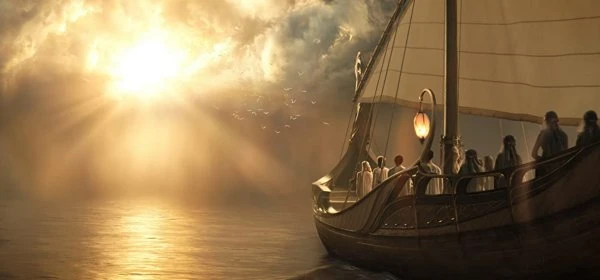
Some Tolkien fans were determined from the start to find fault with the project and will concede nothing in its favour. Your reviewer was definitely never among them. It would have cheered this cynical old critic enormously had this show lived up to its potential. It would have been wonderful to have had a return to the excitement of early 'Game of Thrones,' when one could literally not wait for the next episode. It would have been perfect if this could have been accompanied by that sense of the magical which is found in Tolkien's writings.
One can therefore understand the intense disappointment of the more passionate Tolkienites. To many these books are an important part of their lives - which is, of course, why Amazon brought the rights - and their anger at the way they have been abused was foreseeable. Some of the most dedicated consider the Appendices to 'The Lord of the Rings' their favourite part of the novel because they show the depth of Tolkien's "world building" and hint at so many other stories yet to be told. It is not that this adaptation is entirely bad. It is just that there could have been, and should have been, something really special here.
Even so, when all is said and done, 'The Rings of Power' is still compulsive viewing: your reviewer did indeed find himself looking forward eagerly to the next episode - if not necessarily for the reasons Amazon had in mind. Some of those 'YouTube' critiques are a lot more entertaining than the actual show, but one cannot appreciate them fully without first watching what they are criticising. They are also the best reason to look forward to the next season.
Seen this show? How do you rate it?
Seen this show? How do you rate it?
Published on October 18th, 2022. Written by John Winterson Richards for Television Heaven.


